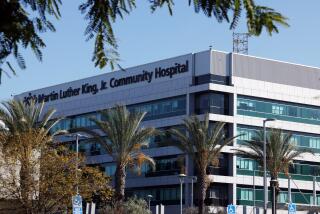Hospital Wants Some Money Back : Grossmont Hopes to Recoup Part of Trauma Center Fee
- Share via
Officials at Grossmont Hospital, which dropped out of the county trauma system Thursday after a patient’s controversial death, plan to ask the Board of Supervisors to return about half of the hospital’s $150,000 annual fee for receiving designation as a trauma center.
Hospital administrator Ron Dahlgren said Monday that the hospital’s early withdrawal, after only five months as a trauma center, entitles it to receive back “somewhere around $80,000.” Dahlgren plans to appear before the board today to defend Grossmont’s performance as a trauma center. (The hospital’s trauma center has recently come under scrutiny by state agencies.) However, Dahlgren said he doesn’t plan to ask for the money back today. He said he wants to wait until he has worked out the details of the request with the hospital’s attorney, John Whitney.
“I want to make one issue at a time,” Dahlgren said.
If the money is returned, Dahlgren argued, the trauma system should still be able function well because Palomar Hospital in Escondido entered the system Jan. 1 and has just paid its $150,000 fee. The required entry fee goes toward the costs of the system, including electronic equipment to link trauma centers with ambulances.
No Provision for Refund
But Gail Cooper, the county emergency medical services director, said late Monday that there is no provision in Grossmont’s trauma contract for the return of the money if the hospital chooses to withdraw from the program.
Had the county terminated the contract, Grossmont could have received some money back, Cooper explained. But she said that she believed Grossmont made the move to end the contract.
However, Cooper speculated, the Board of Supervisors could choose to modify the contract to return some of the money.
On Dec. 18, Grossmont’s board of directors decided to bail out of the county’s 5-month-old trauma system because the hospital was getting too few patients and absorbing unusually high costs.
Under the trauma care system, designated hospitals are supposed to equip their trauma centers with top-of-the-line diagnostic and surgical equipment, and staff them 24 hours a day with highly trained neurosurgeons and other top-quality emergency personnel.
While the trauma center designation is prestigious, the expense was too high, Grossmont officials said. They figured the hospital might have to spend $1.4 million in the next year or so to comply with the county’s requirements for staffing a trauma center.
So the board decided last month to leave the system as of today. Then on Thursday Cooper suspended Grossmont as a trauma center.
She did so at the request of Dahlgren, who had conceded to county officials that he could not guarantee that a trauma surgeon would be available at the center around the clock, as county officials require.
The question of when a trauma surgeon would be on duty had become a controversial one for Grossmont after one of its patients died on Dec. 25.
The patient, a gunshot victim named Nickey Trevino, was brought to Grossmont’s trauma unit but was only “stabilized” there because no trauma surgeon was on duty. After 36 minutes at Grossmont, he was transferred to UC San Diego Medical Center, where he died after surgery.
After that, officials at the state Department of Health Services and Board of Medical Quality Assurance announced that they were investigating Grossmont’s trauma center and the delay in surgical care for Trevino.
Soon after that announcement and several conversations with county health officials, Dahlgren asked Cooper to let the hospital withdraw from the trauma care system early.
County officials expect the supervisors to ratify that suspension today.
More to Read
Sign up for Essential California
The most important California stories and recommendations in your inbox every morning.
You may occasionally receive promotional content from the Los Angeles Times.













